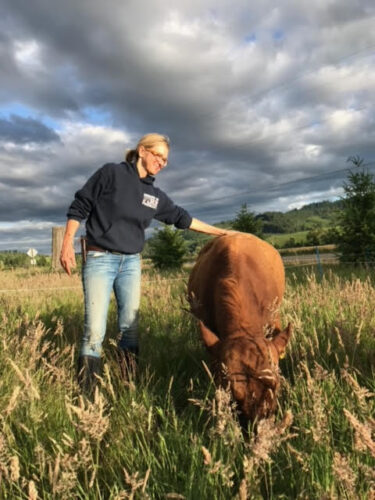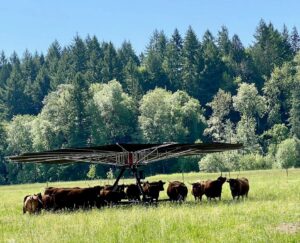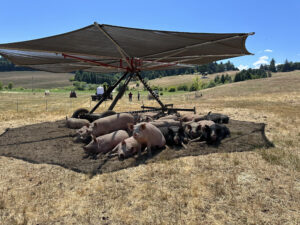 Shade Haven customer and successful artist, Brenda Smola-Foti set down her paintbrushes in 2017 to focus on the 33-acre farm she purchased in the Willamette Valley near Carlton, Oregon. Committed to farming regeneratively, Smola-Foti has transformed the nearly unfarmable land into a sustainable multi-species masterpiece – Tabula Rasa Farms.
Shade Haven customer and successful artist, Brenda Smola-Foti set down her paintbrushes in 2017 to focus on the 33-acre farm she purchased in the Willamette Valley near Carlton, Oregon. Committed to farming regeneratively, Smola-Foti has transformed the nearly unfarmable land into a sustainable multi-species masterpiece – Tabula Rasa Farms.
To fulfill her vision for Tabula Rasa Farms, Smola-Foti first had to resurrect land damaged by years of soil erosion and runoff. In a region that annually experiences three to four months with very little rainfall, her biggest challenge was water infiltration and retention.
To enhance water security on the farm, she hired Elemental Ecosystems to repair erosion zones and construct a stock pond and spillways to capture the rains that fell during the rainy season. The process and progress of the water restoration project is documented on the farm’s website.
Enter Shade Haven
Today, the repaired lands of Tabula Rasa Farms support 75 Devon-Dexter mix beef cattle, 100 pasture-raised heritage hogs, and pastured free-range poultry. The livestock are grazed rotationally, a practice that builds the water-retaining capacity in the soil. Smola-Foti says her focus on water retention and rotational grazing go hand in hand – both enable her to get more rotations on the land.
The farm’s three Shade Haven mobile shade systems keep the livestock healthy and on pasture. Two SH1200 Shade Havens are dedicated to the cattle, while the farm’s SH600 keeps the hogs cool and productive. “One pasture where we pasture hogs doesn’t have a lot of trees. We use the Shade Haven there,” says Smola-Foti. “The hogs love it!”
“Summer is pretty hard on animals – especially here in the Pacific Northwest where summers keep getting hotter,” she adds. “We did a lot of research with Joel Salatin on how to move the animals, and how they need shade. If you get them away from the trees, you can better manage the manure.”
For Smola-Foti the Shade Haven is not just a pasture management tool, it keeps her animals comfortable and gaining weight. That’s important to her and her farm’s bottom line. “I love having the Shade Haven in my toolbox. It lets me put the shade where I want it. When we get those really hot temperatures, I can feel good about my animals being outside, because I know they have shade.”
Integration and interconnection
Smola-Foti’s farm supplies beef, pork, chicken and organically grown vegetables to Humble Spirit, the restaurant she launched last year in nearby McMinnville, Oregon. Additionally, the farm’s products are sold direct to customers and to other restaurants through her farm store and online marketplace called Source Farms. Other like-minded regenerative farms in the area also sell their products through Source Farms.
Tabula Rasa Farms is in Oregon’s wine country, a region that draws a lot of tourism. Smola-Foti’s husband Frank Foti joined her on the farm in 2019, expanding her vision of the farm to include more agrotourism and hospitality. The couple added guest accommodations at a nine-room Bed and Breakfast and at the original farmhouse. Tabula Rasa also hosts farm tours and other programing throughout the year. When guests see the Shade Havens in Smola-Foti’s pasture, it is an undeniable symbol of her commitment to regenerative agriculture and humane treatment of her livestock.
In 2022 Smola-Foti and her husband launched The Ground, showcasing products and experiences in the Willamette Valley, primarily centered around regenerative agriculture.
“More and more people are starting to understand the importance of regenerative agriculture on climate and health,” says Smola-Foti, who proudly refers to her farm as a “learning lab,” since many of her farm hands go on to start their own regenerative farms.
Though she knows her art will call her back someday, Smola-Foti says she is content managing and fine-tuning the farm she loves. “Right now, the earth is my canvas.”

